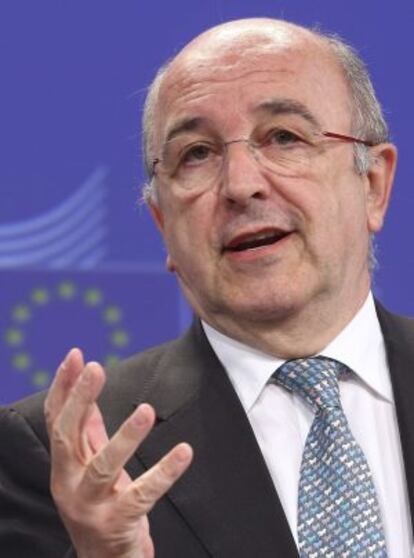Markets suffer Black Monday as regions clamor for financial help
Spanish risk premium hits highest level since single currency introduced Regulator’s ban on short selling allows stocks to recoup some losses

Skeptical investors renewed their assault on Spain’s financial markets on Monday as the risk premium hit yet new euro-era highs and the stock market lost further ground, after Murcia on Sunday said it would join Valencia in asking for a bailout from the central government.
The sharp falls prompted the National Securities Commission (CNMV) to ban short selling on financial instruments around noon. That helped the blue-chip Ibex 35 to recover some of its earlier losses.
The 100-billion-euro European rescue package for Spain’s banks agreed on Friday did little to assuage market fears, as did the 65 billion euros in spending cuts over the next two and a half years announced by the government of Mariano Rajoy, raising the specter of the need for a full-scale bailout.
Investors fear that those measures could drive an economy already in recession for the second time in three years into a deep depression, which would make it even harder to cut the public deficit and service its debt.
The Bank of Spain on Monday estimated quarter-on-quarter contraction in GDP in the second quarter widened to 0.4 percent from 0.3 percent in the first. The deputy governor of the central bank, Fernando Restoy, told reporters more reforms were required to overcome the crisis. “The tensions in the markets reflect the problems facing Spain and the euro zone,” Restoy said. “We need more adjustments, more reforms and more mechanisms to strengthen the euro zone.”
Economy Minister De Guindos said the solution lay “beyond the reach of governments”
The yield on the benchmark 10-year government bond was at 7.498 percent, a level the government has acknowledged is unsustainable.
The spread with the German equivalent up 22 basis points by the close from Friday at 632 basis points. Ealier in the session, it hit a new euro-era low of 642 basis points.
The Ibex 35 closed down 1.10 percent at 6,177.40 points. It was off over five percent at well under 6,000 points before noon before the CNMV stepped in with its short-selling ban. The benchmark index had lost 5.8 percent on Friday.
“The extremely volatile situation that the European stock markets are experiencing could disturb their orderly functioning and affect the normal development of financial activity,” the CNMV said in a statement justifying the ban. The prohibition affects any type of operation involving shares or indexes in official and over-the-counter derivatives markets.
The Italian regulator Consob also announced a ban on short selling on Monday.
Investors are right to fret over what an additional 18 billion euros of funding would do"
Speaking in Brussels, European Union vice president and commissioner for competition, Spaniard Joaquín Almunia, said Spain did not need a full bailout, but suggested that amendments to the rules of European rescue funds agreed at the last European summit allowing them to purchase sovereign debt in the secondary market should be activated. Spain “can’t do it all on its own,” Almunia said.
In an interview published over the weekend, European Central Bank President Mario Draghi said the bank’s role was not to solve the financial problems of individual euro-zone members, suggesting he was reluctant to reactive the ECB’s bond-purchasing program.
Speaking in Congress, Economy Minister Luis de Guindos also ruled out the need for Spain to follow the path of Greece, Ireland and Portugal in seeking a full-scale bailout.
The minister attributed the assault on Spanish financial assets to “irrationality,” “extreme nervousness” and a “situation of enormous uncertainty.” He said the solution lay “beyond the reach of governments,” suggesting that — other than divine intervention — the solution needed to come from the ECB or European institutions as a whole.
De Guindos was due to meet with German Finance Minister Wolfgang Schäuble on Tuesday, Reuters quoted a spokeswoman for the minister as saying. “We believe that the reforms initiated by Spain will help calm the markets,” said spokeswoman Marianne Kothe, adding that the regions’ financial problems had nothing to do with the bailout for the banks.
The government has agreed to set up an 18-billion-euro fund to help regions in financial difficulties. “With Spain already struggling to fund itself, investors are right to fret over what an additional 18 billion euros of funding would do,” Bloomberg quoted Harpreet Parhar, a strategist at Credit Agricole in London, as saying.
Murcia said Sunday it would seek up to 300 million euros from the central government, while Valencia estimated its needs at over two billion.
De Guindos told lawmakers that the interest rate on the 100-billion-euro loan for the country’s banks would be 1.5 percent, while the bad bank to absorb lenders’ toxic assets would be set up by November.







































